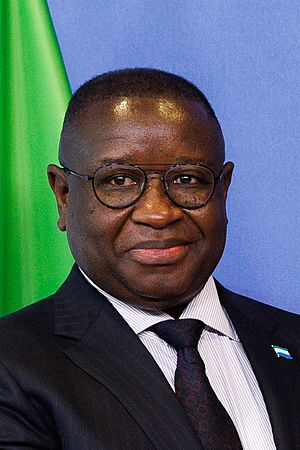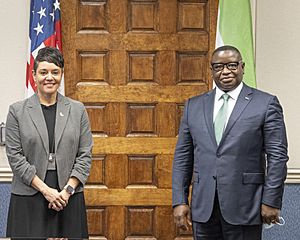Julius Maada Bio facts for kids
Quick facts for kids
Julius Maada Bio
|
|
|---|---|

Bio in 2023
|
|
| 5th President of Sierra Leone | |
| Assumed office 4 April 2018 |
|
| Vice President | Mohamed Juldeh Jalloh |
| Chief Minister | David J. Francis Jacob Jusu Saffa David Sengeh |
| Preceded by | Ernest Bai Koroma |
| Chairman of the National Provisional Ruling Council | |
| In office 16 January 1996 – 29 March 1996 |
|
| Deputy | Komba Mondeh |
| Preceded by | Valentine Strasser |
| Succeeded by | Ahmad Tejan Kabbah |
| Deputy Chairman of the National Provisional Ruling Council | |
| In office June 1993 – March 1995 |
|
| Chairman | Valentine Strasser |
| Preceded by | Solomon Musa |
| Succeeded by | Komba Mondeh |
| Chief of the Defence Staff | |
| In office March 1995 – January 1996 |
|
| Head of State | Valentine Strasser |
| Preceded by | Kellie Conteh |
| Succeeded by | Joy Turay |
| Personal details | |
| Born |
Julius Maada Wonie Bio
12 May 1964 Tihun, Bonthe District, Sierra Leone |
| Political party | Sierra Leone People's Party |
| Spouse |
Fatima Bio
(m. 2013) |
| Children | 5 |
| Residences | State Lodge, Freetown |
| Alma mater |
|
| Military service | |
| Allegiance | |
| Branch/service | Sierra Leone Army |
| Years of service | 1985–1996 |
| Rank | Brigadier |
| Commands | Republic of Sierra Leone Armed Forces |
| Battles/wars |
|
Julius Maada Wonie Bio (born May 12, 1964) is a politician from Sierra Leone who became the country's fifth president on April 4, 2018. Before his political career, he was a high-ranking officer, a brigadier, in the Sierra Leone Army.
In 1996, at the age of 32, Bio became the military head of state of Sierra Leone. He led a government called the National Provisional Ruling Council (NPRC). As leader, he helped Sierra Leone return to a government elected by the people. He handed over power to Ahmad Tejan Kabbah, who won the presidential election that year.
After retiring from the military in 1996, Bio moved to the United States. He returned to Sierra Leone in 2005 to re-enter politics. He ran for president in 2012 but did not win. He ran again in 2018 and won, defeating Samura Kamara.
As president, Bio has focused on new policies, such as providing free education for primary and secondary school students. His government also removed the death penalty. He was re-elected in 2023, although some international observers had concerns about the election process.
Contents
Early Life and Education
Julius Maada Wonie Bio was born on May 12, 1964, in the village of Tihun in the Bonthe District of Sierra Leone. He was born just three years after Sierra Leone gained its independence. His father, Charlie Bio II, was a Paramount Chief of the Sherbro people. Maada Bio was the 33rd of his father's 35 children.
Bio started his education at a Roman Catholic primary school in his home village. He later moved to the town of Pujehun to live with his older sister, Agnes, who was a teacher. He finished his primary education there.
For his secondary education, Bio attended the Bo Government Secondary School, a well-known boarding school. He spent seven years there and became a school prefect. He graduated in 1984 at the age of 20.
Military Career
After high school, Bio decided to join the military. In 1985, he enrolled in the Republic of Sierra Leone Armed Forces military academy near the capital city, Freetown. He graduated in 1987 as a Second Lieutenant in the Sierra Leone Army.
His first job as an officer was at the Lungi Garrison. He later worked in a special unit created to fight crime along the border with Guinea. In 1990, Bio was sent to Liberia as part of a West African peacekeeping force called ECOMOG. This force was working to bring peace during the Liberian civil war.
After a year in Liberia, Bio and other soldiers were ordered back to Sierra Leone. They were needed to fight against rebels from the Revolutionary United Front (RUF) who were attacking villages. This was the beginning of the Sierra Leone Civil War.
A Young Leader in Government
The 1992 Military Coup
On April 29, 1992, Bio was part of a group of young soldiers who removed President Joseph Saidu Momoh from power in a military coup. The soldiers formed a new government called the National Provisional Ruling Council (NPRC). The group's leader, Valentine Strasser, became the new head of state.
Bio was given important roles in the new government. He was first put in charge of the southern region of the country. Later, he became the Secretary of State for Information and Broadcasting in Freetown. He was promoted to Captain and eventually became the Deputy Chairman of the NPRC, making him the second-in-command.
The 1996 Military Coup
On January 16, 1996, Bio led another coup. This time, he removed Valentine Strasser from power. There was a disagreement among the leaders about whether to hold elections during the ongoing civil war. Bio and other senior soldiers believed it was important to move forward with elections to restore democracy.
Strasser was arrested by his own bodyguards and sent into exile in the neighboring country of Guinea. Bio then became the new military head of state of Sierra Leone. He promised to hold elections and hand over power to a civilian government, which he did just a few months later in March 1996.
Return to Politics
After leaving the military in 1996, Bio moved to the United States. He studied at American University in Washington, DC, where he earned a master's degree in International Affairs. He also ran a consulting and investment company.
In 2005, Bio returned to Sierra Leone and joined the Sierra Leone People's Party (SLPP). He tried to become the party's leader but came in third place. In 2011, he was chosen as the SLPP's presidential candidate for the 2012 election. He lost to the current president, Ernest Bai Koroma, but his campaign helped make the SLPP a strong opposition party.
President of Sierra Leone (2018–present)

2018 Election
Julius Maada Bio ran for president again in 2018. In the final round of voting on March 31, 2018, he won with 51.8% of the vote. He succeeded Ernest Bai Koroma, who could not run again because of term limits in the constitution.
Domestic Policy
One of President Bio's first major actions was to introduce free education for primary and secondary students in public schools. He also removed application fees for students applying to public universities. His government reviewed many government contracts and departments from the previous administration to check for corruption.
In February 2019, President Bio declared a state of emergency to address violence in the country and increased penalties for serious crimes. In 2023, he signed a law to make sure that at least 30% of candidates in elections are women.
However, his government faced challenges. In August 2022, there were protests about the rising cost of living. Bio called the protests an attempt to overthrow his government.
Foreign Policy
President Bio has been active in international affairs. In 2021, he attended the Global Education Summit in London and met with British Prime Minister Boris Johnson to discuss strengthening the relationship between their countries. He was invited because of his work to improve access to education in Sierra Leone.
In 2023, Bio called for an end to the Russian invasion of Ukraine, saying it was important for the sake of humanity. He expressed hope that African leaders could help find a peaceful solution to the war.
2023 Election
Bio ran for re-election in 2023 against twelve other candidates. His main opponent was Samura Kamara. Bio was declared the winner with 56% of the vote. However, some election observers and his opponent raised concerns about the transparency of the vote counting.
Leader of ECOWAS
On June 22, 2025, Julius Maada Bio was elected president of the Economic Community of West African States (ECOWAS). The decision was made during a summit of leaders in Abuja, Nigeria.
Personal Life
Maada Bio is an ethnic Sherbro and a practicing Roman Catholic. His wife, Fatima Bio, is a practicing Muslim. She is an actress and has both Gambian and Sierra Leonean heritage. They were married in 2013 in London in a ceremony that included both Christian and Muslim traditions.
The couple has one child together. Bio also has three other children from a previous marriage.
Honours
Foreign honours
Honorary doctorates
 China University of Geosciences (Wuhan) (2 March 2024)
China University of Geosciences (Wuhan) (2 March 2024)
See also
 In Spanish: Julius Maada Bio para niños
In Spanish: Julius Maada Bio para niños
 | Jackie Robinson |
 | Jack Johnson |
 | Althea Gibson |
 | Arthur Ashe |
 | Muhammad Ali |

